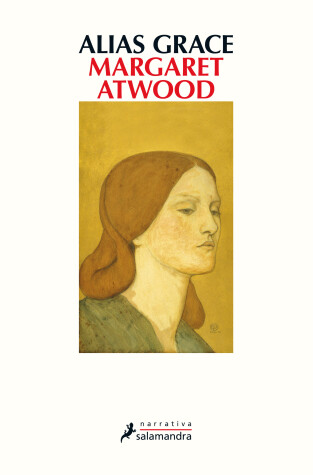Reviewed by brokentune on
Murderer is merely brutal. It’s like a hammer, or a lump of metal. I would rather be a murderess than a murderer, if those are the only choices."
Alias Grace is Margaret Atwood's record of Grace Marks, who convicted of murder, spent thirty years in prison and a mental institution before being pardoned.
The book is based on true events of one of Ontario's most ambiguous cases - there was a confession but there was also an episode of amnesia - or was there?
"You won’t believe me, Sir, I say. Anyway it’s all been decided, the trial is long over and done with and what I say will not change anything. You should ask the lawyers and the judges, and the newspaper men, they seem to know my story better than I do myself."
Atwood pieces together the records about Grace Marks in this book, paying much attention to the details of characters, conditions, and to the analysis of contradictions in those various records. As a result Alias Grace is not just a biography of Grace Marks but more poignantly a record of women's lives in mid-nineteenth century Ontario.
It's a harsh read, full of tragedy and hardship, of misogyny, of ignorance, violence, hypocrisy.
Grace, whilst incarcerated, spends periods of time in the mental hospital associated with the prison - and we never find out whether there was a need for her to be there or whether she sought a reprieve from prison conditions.
"They wouldn’t know mad when they saw it in any case, because a good portion of the women in the Asylum were no madder than the Queen of England. Many were sane enough when sober, as their madness came out of a bottle, which is a kind I knew very well. One of them was in there to get away from her husband, who beat her black and blue, he was the mad one but nobody would lock him up; and another said she went mad in the autumns, as she had no house and it was warm in the Asylum, and if she didn’t do a fair job of running mad she would freeze to death; but then in the spring she would become sane again because it was good weather and she could go off and tramp in the woods and fish, and as she was part Red Indian she was handy at such things. I would like to do that myself if I knew how, and if not afraid of the bears."
Considering that the treatment of mental illness at the time was nothing short of barbaric, the indication that people would voluntarily submit to the asylum was one of the most evocative illustrations of the conditions endured by the women described in the book.
When reading the book, I was reminded of The Handmaids Tale. It occurred to me that this was simply a re-working of the biography of Grace Marks from the same perspective that focused on the unfair and unequal treatment of women in The Handmaids Tale.
I am hesitant to use the term "feminist" here as I don't want to taint the term with, I guess, my own criticism of the perspective used by Atwood in Alias Grace. What was lacking for me in this novel was the presence of any decent men in Grace's story prior to her incarceration. This notable absence, even more so the portrayal of men in a bad light throughout almost the entire book, made it difficult to trust the credibility of the descriptions - as otherwise this would have been a 5* read.
"...the real curse of Eve was having to put up with the nonsense of Adam, who as soon as there was any trouble, blamed it all on her."
What I did enjoy about the book, tho, was that it did not seek to provide answers or morals. After all, Grace's story is set in an almost amoral environment where wisdom is not gained by learning or status but only by living.
"The pattern of this quilt is called the Tree of Paradise, and whoever named that pattern said better than she knew, as the Bible does not say Trees. It says there were two different trees, the Tree of Life and the Tree of Knowledge; but I believe there was only the one, and that the Fruit of Life and the Fruit of Good and Evil were the same. And if you ate of it you would die, but if you didn’t eat of it you would die also; although if you did eat of it, you would be less bone-ignorant by the time you got around to your death."
Reading updates
- Started reading
- 3 November, 2015: Finished reading
- 3 November, 2015: Reviewed
